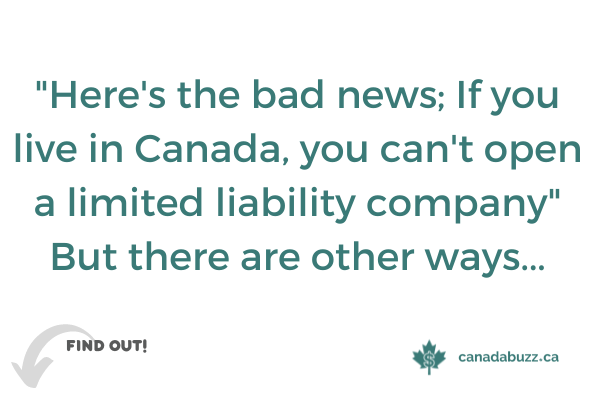There are many advantages to opening a Limited Liability Company (LLC) which we will discuss. But to open one, you must register your company first.
In this piece, we’ll talk more about limited liability and how to register your company in Canada. So let’s get started.
What is a Limited Liability Company?
A Limited Liability Company is a structured type of business wherein the company owners are not held personally liable for any debts of the company.
Limited Liability companies are much like a corporation, but also hold many similarities to a sole proprietorship or partnership as well. They are like corporations because they hold limited liabilities but like partnerships because they have flexibility in splitting profits.
What are the advantages of an LLC?
Many advantages come along with opening a Limited Liability Company. The main benefit, as you probably already suspected, is limited liability. When you own a partnership or sole proprietorship, you are considered one with your business. That means that any debts that have occurred within your business become personal debt.
But when you own a limited liability company, these liabilities become lessened. This means that if you incur debt in your business, your personal assets such as your home and bank account are still protected. In this sense, LLCs operate like corporations. That’s a huge benefit to have if your company ever undergoes difficult times.
We mentioned earlier that LLCs are also more flexible when it comes to ownership. Corporations can’t have more than 100 shareholders. But LLCs have zero restrictions on how many owners or the type of owners that a company can have. In this sense, LLCs are more like partnerships or sole proprietorships.
In many ways, LLCs are the best of both worlds in terms of partnerships/sole proprietorships and corporations. They also get the best of both worlds when it comes to taxes. In such a case, LLCs don’t have their own classifications. Instead, they can take on the category of partnerships, sole proprietorships, S corporations, or C corporations.
RELATED: How to Register a Business in Alberta
How do you Register an LLC in Canada?
Here’s the bad news. If you live in Canada, you can’t open a limited liability company for the simple fact that they do not exist in Canada. With that being said, because Canada has such a close partnership with the United States, we do allow limited liability companies from the US to expand into Canada and our provinces.
To do this, limited liability companies from the United States must register under Provincial Corporation laws, which vary from province to province.
For example, in British Columbia, limited liability companies from the United States would register the same way a corporation would be expected to. In Manitoba, LLCs also register the same way a corporation would but are also expected to submit additional documents for the company.
In Newfoundland, LLCs must provide a copy of their Operating Agreement to the Director of Commercial Registrations. And in Ontario, LLCs do not register as corporations at all. Instead, they register under the Ontario Business Names Act.
Each province has its own rules and regulations for registering a Limited Liability Company.
Limited Partnerships in Canada
The Canadian version of a Limited Liability Company (LLC) is a Limited Liability Partnership (LLP). LLP is a type of partnership in which each partner has limited liability protection against the actions of other partners, similar to an LLC. However, unlike an LLC, which is a separate legal entity, an LLP is not a distinct legal entity and is instead considered an extension of the partners themselves.
It’s important to note that while the LLP provides limited liability protection, it also requires that at least one partner assumes unlimited liability. The partner with unlimited liability is typically responsible for any debts or obligations incurred by the partnership that is not covered by the partnership’s assets or insurance.
RELATED: How to Register a Trademark in Canada
Can Canadians set up a Limited Liability Company in the United States?
Yes. Canadians can open up limited liability companies in the United States. However, this can be very messy when it comes to taxes.
Because the Canada Revenue Agency does not recognize limited liability companies and treats them as corporations, those who own an LLC in the United States may be taxed twice on their income. For this reason, it’s always better for Canadians to set up a regular Corporation if they are going to open a company in the United States.
If you are considering opening a limited liability company there, you should consult a cross-border accountant first.
In conclusion, the Canadian Revenue Agency (CRA) and Government do not recognize Limited Liability Companies in Canada. For this reason, Canadians cannot open them.
Americans, however, do have the option of extending their LLCs into Canada by registering them under provincial corporation laws. Depending on which province you wish to register, laws and rules may vary.
You Might Want To Read













